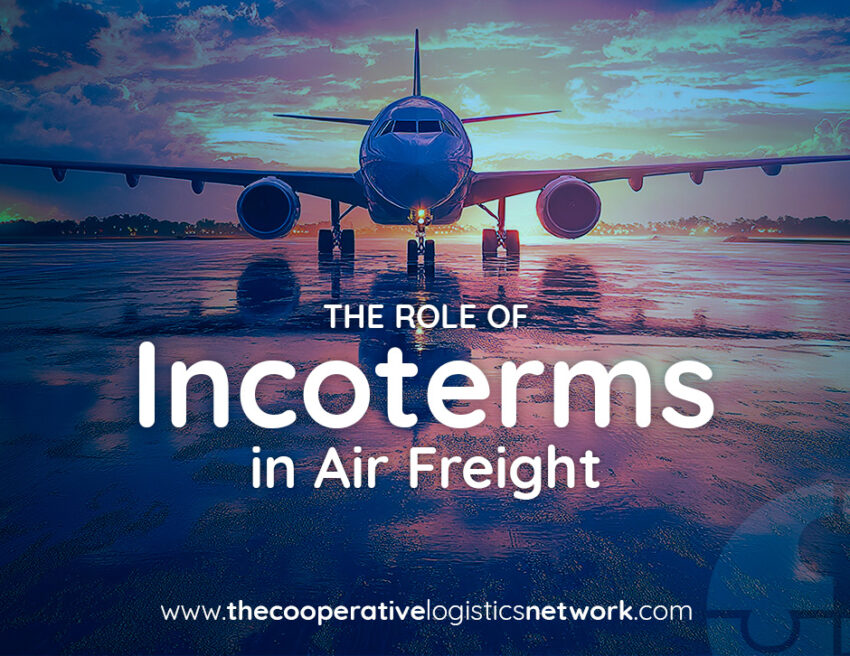Air freight is one of the fastest-growing sectors in global trade, providing businesses with a vital link to international markets. As an air freight forwarder, understanding the intricacies of Incoterms—the international commercial terms governing the responsibilities of buyers and sellers—is essential for providing effective service. The proper use of Incoterms ensures smooth air freight operations, preventing misunderstandings, delays, and unexpected costs. In this blog, we will explore the key Incoterms for air freight forwarders and discuss how they influence the flow of goods in the air freight industry.

What Are Incoterms and Why Should Air Freight Forwarders Care?
Incoterms, established by the International Chamber of Commerce (ICC), define the responsibilities of buyers and sellers in international transactions. These terms determine who is responsible for paying freight costs, who assumes risk during transport, and at which point ownership of the goods transfers from seller to buyer. For air freight forwarders, Incoterms offer a clear framework for managing logistics operations. Without a clear understanding of these terms, air freight forwarders risk making costly mistakes that can lead to delays, disputes, or even legal challenges.
Incoterms also provide a standardized set of rules that international businesses rely on when negotiating contracts. For air freight forwarders, applying the correct Incoterm is vital to avoid potential misunderstandings between clients and service providers. The correct term ensures that costs and risks are accurately distributed, and it allows air freight forwarders to operate more efficiently within a complex, multi-party system of global logistics.
Key Incoterms for Air Freight Forwarders
When it comes to air freight, certain Incoterms are particularly relevant. These terms have a direct impact on both the pricing and the delivery of goods via air transport. Here are a few of the most commonly used Incoterms for air freight:
1. EXW (Ex Works)
EXW places maximum responsibility on the buyer. The seller’s only obligation is to make the goods available at their premises, typically a factory or warehouse. From that point onward, the buyer arranges and pays for all transportation, including pickup, export clearance, air freight, and final delivery. Risk transfers to the buyer as soon as the goods are ready for collection. This term is best suited for buyers who have strong logistics capabilities or work with freight forwarders who can manage the entire shipment process.
2. FCA (Free Carrier)
FCA is one of the most commonly used Incoterms for air freight. Under this term, the seller delivers the goods to a carrier or a location specified by the buyer, which could be an airport or a freight forwarder’s warehouse. The seller is responsible for export clearance, while the buyer takes over transportation costs and risk once the goods are handed to the carrier. FCA is flexible and efficient for air shipments, as it allows the buyer to control the main leg of transport without unnecessary seller involvement.
3. CPT (Carriage Paid To)
CPT means the seller pays for transportation to a named destination, typically the buyer’s airport of choice. However, risk transfers to the buyer as soon as the goods are handed over to the first carrier (e.g., the airline). The seller covers freight costs but does not include insurance unless specified separately. This term is useful when buyers want the seller to arrange air freight but prefer to manage risk and final delivery themselves.
4. DAP (Delivered at Place)
DAP is a popular choice for air freight because it places responsibility for all costs, risks, and logistics on the seller until the goods arrive at the agreed destination. This term offers a high level of certainty for air freight forwarders, as it clearly defines where their responsibility begins and ends, making it easier to manage delivery schedules and costs.
5. DDP (Delivered Duty Paid)
Under DDP, the seller is responsible for all costs and risks associated with delivering the goods to the buyer’s premises, including import duties and taxes. This term is less common in air freight but can be used when buyers require door-to-door delivery. For air freight forwarders, DDP ensures that all logistics are handled smoothly, from departure to final delivery.
For air freight forwarders, FCA and CIP are often the most practical choices, balancing cost and risk allocation efficiently.
How Incoterms Impact Air Freight Forwarders’ Operations
Understanding and applying Incoterms correctly is critical for the effective operation of air freight forwarders. These terms affect the cost structure, risk management, and communication processes. Let’s explore how Incoterms influence air freight operations in greater detail.
1. Cost Distribution and Pricing Clarity
One of the main reasons air freight forwarders must pay attention to Incoterms is the impact they have on cost distribution. When negotiating air freight services, the agreed Incoterm defines which party is responsible for costs such as transport, insurance, and duties. This clarity helps prevent disputes between the forwarder and the client about who bears the costs, thus avoiding unnecessary conflicts or miscalculations.
By using Incoterms to clearly outline the financial responsibilities, air freight forwarders can provide accurate pricing estimates to their clients, making the quoting process more transparent and efficient. For instance, with terms like DAP and DDP, the freight forwarder has a clear understanding of the seller’s and buyer’s obligations, which helps to ensure the correct charges are passed on to the client.
2. Risk Management and Liability
Another critical aspect of Incoterms is how they define the allocation of risk between the buyer and seller. The risk associated with the goods can change hands multiple times during the air freight process, and Incoterms dictate when the buyer or seller assumes responsibility for any damage, loss, or theft.
For air freight forwarders, understanding which party bears the risk at each stage is crucial for proper logistics management. For example, under FOB, the seller is responsible for risk until the goods are loaded onto the aircraft. However, with DDP, the seller assumes full risk until the goods are delivered to the buyer’s door.
3. Import and Export Compliance
For air freight forwarders, compliance with import/export regulations is non-negotiable. Using the correct Incoterm helps ensure that customs duties, taxes, and import/export regulations are followed correctly. For instance, if a shipment is under a DDP term, the seller must ensure that all customs paperwork and payments are completed before delivery. If a mistake is made, it could lead to delays, fines, or even confiscation of goods.
By correctly applying Incoterms in air freight, forwarders ensure smoother, faster clearance through customs, reducing the chances of unnecessary delays or additional costs that could affect delivery timelines and client satisfaction.
Challenges Air Freight Forwarders Face When Applying Incoterms
While Incoterms offer numerous benefits, their correct implementation can be challenging. The complexity of global logistics means that air freight forwarders often work with a variety of stakeholders—shippers, consignees, carriers, and customs authorities—each with their own understanding of Incoterms. This can lead to misinterpretations, mistakes, or inefficiencies if the terms aren’t carefully explained and followed.
Moreover, air freight forwarders must stay up-to-date with the latest changes to Incoterms and ensure that they communicate these changes effectively with their clients. Even small misunderstandings can have significant consequences, including cost overruns or delays.
Final Thoughts: Mastering Incoterms for Successful Air Freight
For air freight forwarders, mastering Incoterms is not just about knowing the definitions of the terms; it’s about applying them in the context of air freight operations to minimize risk, manage costs, and ensure smooth, efficient service for clients. By understanding the responsibilities associated with each Incoterm, forwarders can safeguard against potential pitfalls, enhance operational efficiency, and build stronger relationships with clients.
Incorporating Incoterms knowledge into daily air freight operations is essential for forwarders who wish to stay competitive in the rapidly evolving logistics landscape. Whether dealing with FOB, CIF, DAP, or any other term, air freight forwarders must remain vigilant in ensuring the correct application to help their businesses grow and thrive in 2025 and beyond.


